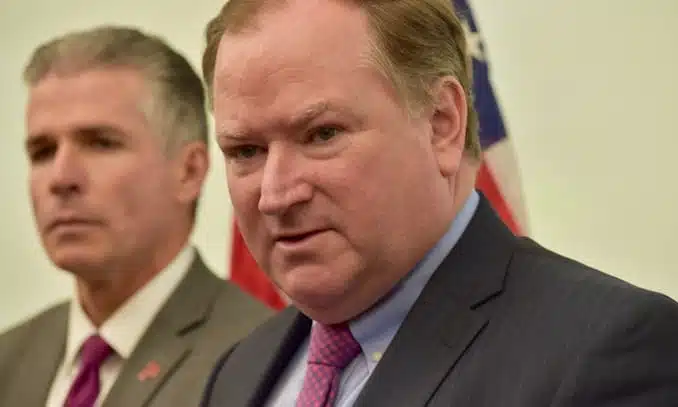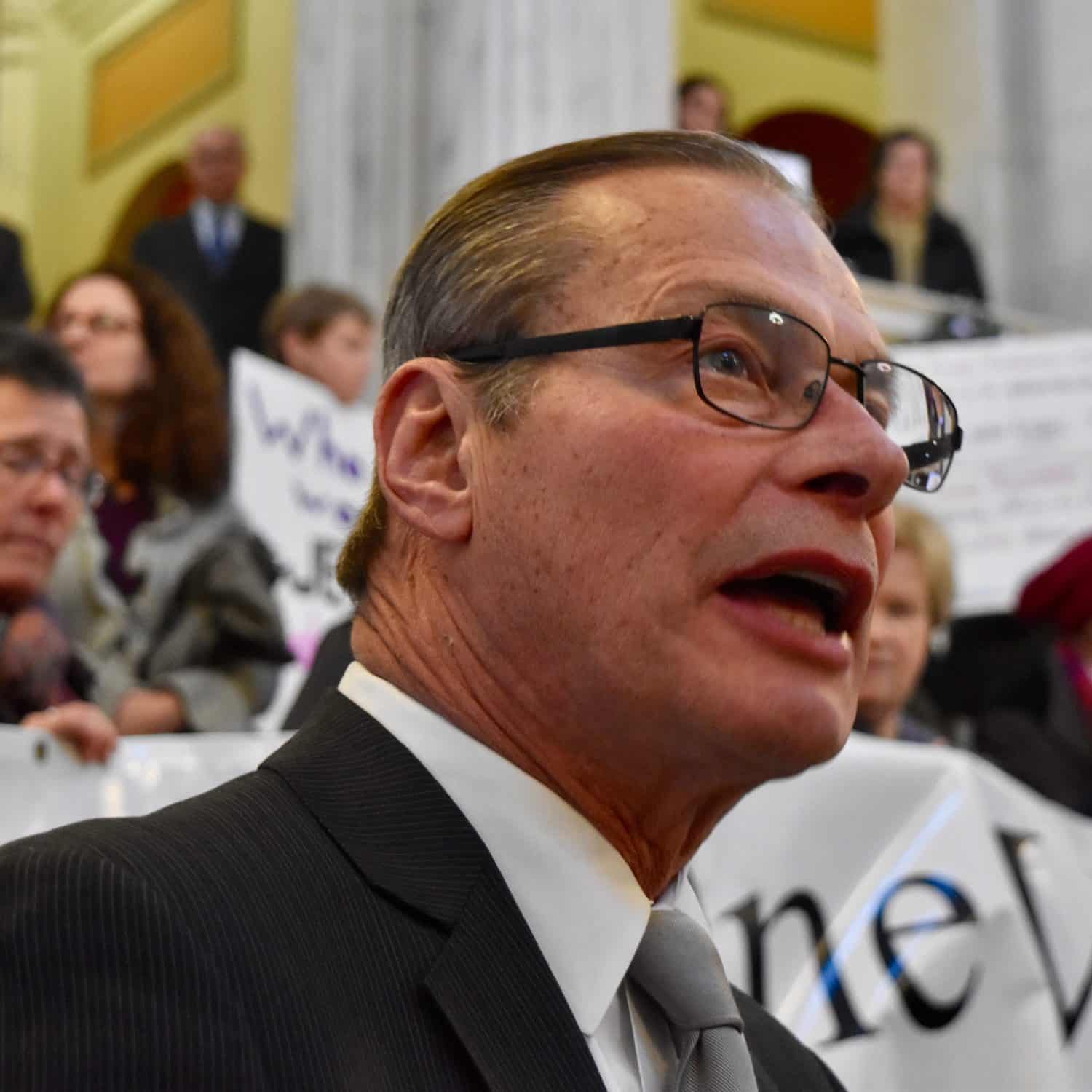Senate Leadership threatens passage of childhood sexual abuse legislation
Representative Carol Hagan McEntee (Democrat, District 33, South Kingstown, Narragansett) and Senator Donna Nesselbush (Democrat, District 15, Pawtucket) have been working for years to pass bills that would extend or eliminate the statute of limitations for victims of childhood sexual abuse. “importantly, the legislators are advocating for legislation that will allow victims to bring lawsuits against both perpetrators and the
June 18, 2019, 6:57 am
By Steve Ahlquist
Representative Carol Hagan McEntee (Democrat, District 33, South Kingstown, Narragansett) and Senator Donna Nesselbush (Democrat, District 15, Pawtucket) have been working for years to pass bills that would extend or eliminate the statute of limitations for victims of childhood sexual abuse. “importantly, the legislators are advocating for legislation that will allow victims to bring lawsuits against both perpetrators and the institutions that protected them or allowed the abuse to occur.
Last year, shortly after the General Assembly closed for the year without passing such legislation, a grand jury in Pennsylvania released a staggering report on the extent of sexual abuse in the Catholic Church in six out of eight dioceses. Providence Bishop Thomas Tobin, whose lobbying efforts had quashed the bill here in Rhode Island, was the auxiliary bishop of Pittsburgh at that time. In the Providence Journal, Tobin said he was “aware of incidents of sexual abuse when they were reported to the diocese” but, “[e]ven as an auxiliary bishop, I was not primarily responsible for clergy issues.”
Suddenly, General Assembly leadership in both houses looked very, very foolish and shortsighted, promising that next year legislation would get their careful attention. This year the legislation seemed on its way to passage, but now that easy path to passage seems to have stalled. The House and the Senate have passed different versions of the bill. In order for legislation to actually become law, the same bill needs to pass both chambers.

“Unfortunately the Senate passed a very watered down version that I will not support, and neither will the victims,” said Representative Hagan McEntee, speaking at the Rhode Island Democratic Women’s Caucus PAC Monday night. “It is a step in the wrong direction, we’re going backwards. We already have a seven year discovery rule in place, in the law right now. And what the Senate has done is taken that out.”
“This bill unfortunately does not provide for a discovery rule, but as the General Assembly enters into our final weeks,” said Senator Nesselbush. “I hope and pray that the Senate and House leaders will marry the best provisions in our Senate bill with the best provisions in the House bill, including a discovery rule, so that we pass a significant piece of legislation that significantly opens the courthouse doors to these courageous survivors who deserve nothing less.”
See: House Bill 5171A and Senate Bill 0315A
Both the House and Senate bills extend the statute of limitations for child sexual abuse from seven years as is currently the law to 35 years. As to perpetrators, the statute is extended to 35 years even if the victim’s statute of limitations under current law has already passed and the claim would otherwise be time barred. General legal principles toll or stop the running of a statute of limitations until a child reaches the age of majority which is age 18. So 35 years past age 18 means that victims, under this new law, will have 35 years or until age 53 to bring a claim against perpetrators.
Not so against institutions like youth organizations, schools or churches. As to “non-perpetrator defendants,” or these institutions, both the House and Senate bills extend the statute to 35 years but only for those victims who statute of limitations has not already run, meaning only for those victims who are currently under age 25. For victims who are age 25 or older (and there are many, many victims who are now over 25, especially given that the average age of disclosure of childhood sexual abuse is 52), neither bill provides any recourse for victims against an institution that knew or should have known a predator was abusing children.
What could be worse than that? The fact that the Senate bill does not even include a “disclosure rule.” Many childhood victims are not capable of processing the abuse that has happened to them, so they bury the memory deep within their psyche. Psychologically this is called “repressed memory,” and it is very common in cases of childhood sexual abuse. Current law provides victims seven years from when they “discover” that they were abused, to bring a lawsuit against a perpetrator.
The House bill includes the seven-year discovery rule against perpetrators and importantly, it also provides a seven-year discovery rule for lawsuits against institutions that negligently protect the perpetrators. The Senate bill does not include a discovery rule at all, and this appears to be the battle ground as the General Assembly enters its final weeks of session.
Asked why she thought the Senate version does not include a discovery rule, Nesselbush said, “I know our Senate leaders have children, and grandchildren and nieces and nephews. I know they care about victims and children, so I suspect they will simply want to get something from the House in order to include this provision. This is common in the ‘horse trading’ that occurs between both chambers at the end of the General Assembly.”
Nesselbush ended by saying that “29 Senators co-sponsored my original bill which included a discovery rule against perpetrators and institutions, so I know the discovery rule has the support of a super majority of Senators. This should be a no brainer.”
“The victims, Representative McEntee and I will not rest until the Senate agrees to stand on the side of victims and children, allowing a seven-year discovery rule against perpetrators and institutions,“ said Senator Nesselbush.
“The reason the Catholic Church wholeheartedly endorses S315A is because it protects them,”s aid Representative Hagan McEntee. “The church is so in favor of this. This is [also] why the insurance companies like it.”
“As the General Assembly enters into its final weeks I hope and pray that the House and Senate leaders will marry the best provisions of our Senate bill with the best provisions of the House bill, including a discovery rule so that we can significantly move the needle forward and pass legislation that opens the courthouse doors for significant numbers of these courageous survivors who frankly deserve nothing less,” said Senator Nesselbush, speaking on the Senate floor.
The section of the Senate bill Nesselbush believes is an improvement on the House version would allow civil suits for sexual abuse to be filed against cities, towns and the state, including recreational centers, state-run group homes and the state colleges, with a monetary cap for damages. The House version has no such provision.
Capitol TV released a great little video yesterday that really gets to the heart of this issue:
The biggest hurdle to passage is getting Senate leadership to understand the importance of getting this bill passed, with the discovery rule intact. To help pass this bill, consider contacting Senate Leadership here:
Senate President Dominick Ruggerio (Democrat, District 4, Providence) sen-[email protected] (Home) 401-353-1311 (Office) 401-222-6655
Senate Majority Leader Michael McCaffrey (Democrat, District 29, Warwick) [email protected] (Home) 401-739-7576
Senate Majority Whip Maryellen Goodwin (Democrat, District 1, Providence)
[email protected] (Home) 401-272-3102
[email protected] (Office) 401-276-5507
Or contact your Senator. Here’s a full list of contact information.
Also, stay tuned for possible actions. There are only two weeks left in this legislative season to get this done.
[Edit: This post has been updated to better explain the bill’s purpose and the differences between the various bills.]
UpriseRI is entirely supported by donations and advertising. Every little bit helps:
Become a Patron!







